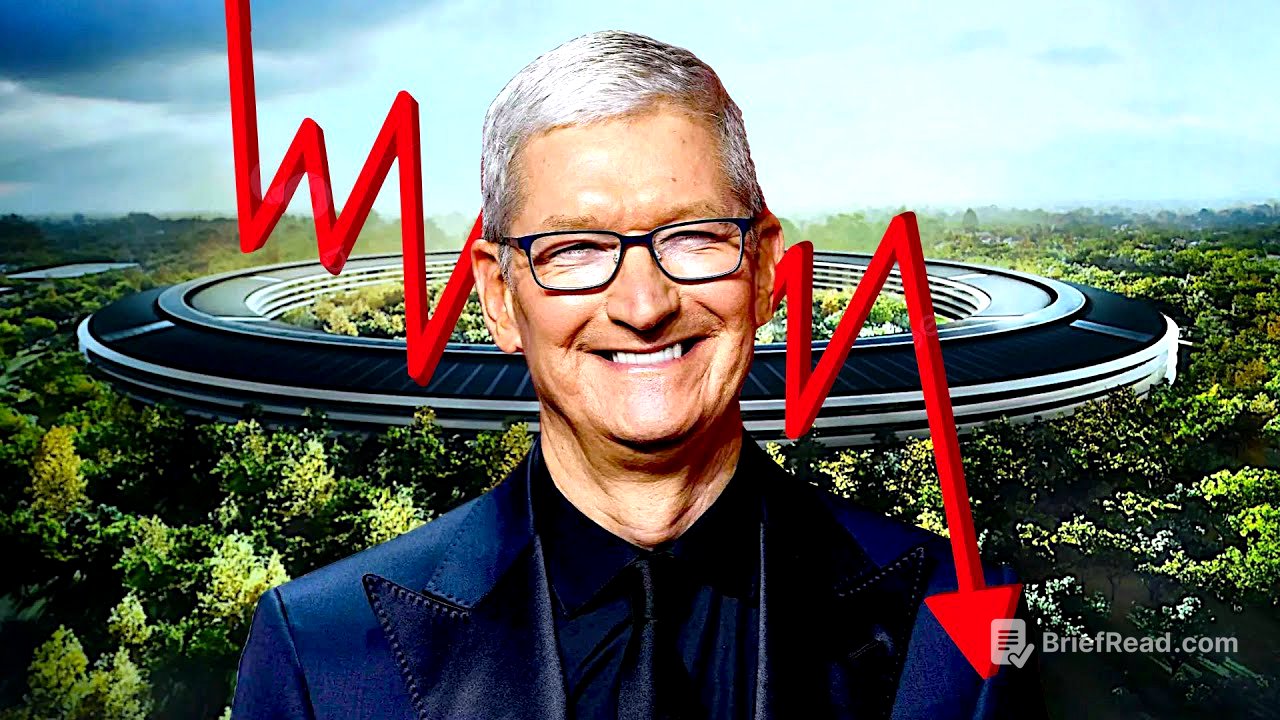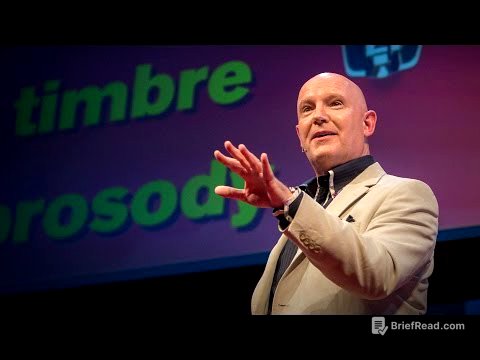TLDR;
The video discusses Apple's decline from being the world's most valuable company to falling behind Microsoft and Nvidia, attributing this to a shift in focus from product innovation to financial engineering under Tim Cook's leadership. It contrasts Steve Jobs' product-centric approach with Cook's emphasis on stock buybacks and dividends, which, while initially pleasing to shareholders, has led to stagnation in innovation and missed opportunities in emerging technologies like AI. The video highlights specific examples, such as the AirPower fiasco and the delayed Apple Intelligence, to illustrate how prioritizing profit over product development has negatively impacted Apple's competitiveness and reputation.
- Apple's value has decreased due to overpriced iPhones, lack of innovation, and anti-competitive practices.
- Tim Cook's leadership shifted the company's focus from product innovation to financial engineering.
- Apple's delayed and fabricated AI technology reveal, along with lawsuits, highlight the consequences of prioritizing short-term stock price over long-term product development.
Introduction: Apple's Fall From the Top [0:00]
Apple's position as the world's most valuable company from 2021 to 2023 has declined, with Microsoft and Nvidia surpassing it in 2025. This drop is attributed to a 28% decrease in Apple's value, amounting to a $1.1 trillion loss in just four months. The reasons behind this decline include overpriced iPhones leading to stagnant sales, a lack of innovation allowing competitors to catch up, and anti-competitive business practices resulting in lawsuits. The video posits that Apple's focus has shifted from prioritizing products to prioritizing profits, a transition that began when Tim Cook took over as CEO in 2011.
Steve Jobs' Product-Centric Approach [0:42]
Steve Jobs believed that great products were the key to Apple's success, a philosophy he demonstrated when he saved the company from bankruptcy in the late 1990s. Despite advice from figures like Larry Ellison to focus on software, Jobs centered his plan entirely on hardware. He streamlined Apple's computer models and launched the iMac, which became a bestseller and restored shareholder confidence. Jobs prioritized turning out great products and communicating with customers, believing that the stock price would take care of itself. Under Jobs, Apple's stock price grew by 11,400% with major new product releases like the iMac, iPod, iPhone, and iPad.
Warren Buffett's Advice and Tim Cook's Financial Engineering [3:58]
In 2010, with nearly $27 billion in cash, Steve Jobs sought advice from Warren Buffett, who suggested acquisitions, dividends, and stock buybacks. Jobs, however, refused dividends and stock buybacks, prioritizing strengthening Apple over directly rewarding shareholders. After Tim Cook became CEO in 2011, he implemented Apple's first dividend and stock buyback program in 2012, initially planning to spend $45 billion but ultimately spending $80 billion by 2015. This financial engineering approach caught the attention of Warren Buffett, who invested a billion dollars in Apple in 2016, signaling a shift towards prioritizing stock price over product development.
The Shift in Apple's Culture and Design Philosophy [7:13]
Tim Cook's leadership marked a shift in Apple's culture, with finance and marketing executives gaining influence over design. Jonathan Ive, the Chief Design Officer, faced resistance to his ideas, particularly those that drove up costs. An example of this was the extravagant introduction I've envisioned for the Apple Watch, which was met with skepticism from the finance team. Cook's reshaping of the company included replacing a marketing-focused board member with a finance chief from Boeing. This shift led to complaints from the design team about repetitive product designs and a focus on financial metrics over innovation.
Price Hikes and Stagnant Innovation [9:53]
While the early years of the iPhone saw stable pricing, Apple began increasing prices in 2017, with the iPhone X marking a significant price hike. This trend continued with subsequent models, leading to a substantial increase in the average selling price of iPhones. Despite the price increases, innovation slowed down, with many Apple products maintaining the same design for several years. This stagnation contrasts with the rapid changes and new product releases that characterized Apple before 2019.
Corporate Greed and Delayed Product Releases [13:07]
An internal email from 2020 revealed Apple's strategy of innovating just enough to keep customers buying without affecting profit margins. This corporate greed influenced decisions such as price increases, declining innovation, and the handling of new product releases. The AirPower fiasco, where Apple announced a wireless charging mat that was ultimately canceled, exemplifies this issue. Apple's tendency to announce products many months in advance, like the Apple Watch and Vision Pro, has become routine, often to reassure shareholders and prevent customers from choosing competing products.
Apple's AI Struggles and Missed Opportunities [17:20]
Despite pioneering on-device voice assistance with Siri, Apple quickly fell behind in the AI space. Siri's outdated technology and Apple's initial discounting of services like ChatGPT hindered their AI advancement. The finance team's decision to limit the purchase of additional GPU chips further hampered Apple's AI development, forcing them to rely on cloud computing resources from Google. This lack of investment in AI led to delays in the release of Apple Intelligence and prompted a lawsuit claiming false advertising.
Prioritizing Shareholders Over Products [23:38]
Apple's prioritization of cost-cutting over innovation has caused them to fall behind in the tech industry. While they lead the world in stock buybacks, their investment in research and development is significantly lower than competitors like Amazon, Google, and Meta. Tim Cook's leadership style, which prioritizes shareholders, has increased Apple's market cap but may have come at the expense of product innovation. Cook's comments about Apple not needing to be first in AI reflect a misunderstanding of the company's historical strength in modernizing industries through product innovation. The video concludes that Apple's focus on profit and the resulting complacency could lead to their downfall.









